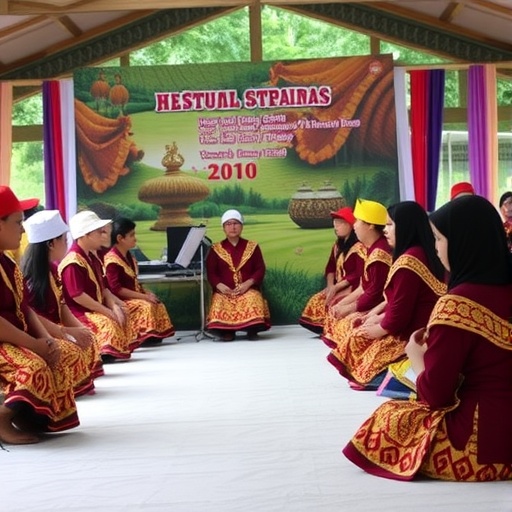In the vibrant cultural landscape of West Sulawesi, a transformative approach to education has emerged, intertwining the rich threads of local heritage with the academic fabric of schools. The study conducted by Yatim, Jayadi, Jamilah, and their colleagues explores the profound potential of integrating cultural heritage into educational practices, particularly through the lens of traditional festivals celebrated in the region. This pioneering research sheds light on the supportive role schools can play in these community events, shaping students’ identities and fostering a deeper connection between generations.
The research highlights not only the significance of traditional festivals in preserving cultural practices but also their educational value. Schools serve as vital platforms where students engage with and experience their cultural heritage firsthand. By actively participating in these festivities, students are given opportunities to learn about their community’s history, values, and beliefs. This immersive experience reinforces their cultural identity and builds a sense of belonging in a rapidly globalizing world.
Furthermore, the findings suggest that this integration of cultural education enhances academic engagement and motivation among students. When lessons are anchored in the cultural context of students’ lives, they become more relevant and relatable. For instance, mathematics could be taught through traditional crafting techniques, or historical events could be analyzed through the lens of local folklore associated with festivals. Such innovative approaches not only make learning more enjoyable but also cultivate critical thinking and creativity.
The role of educators emerges as paramount in this integrative process. Teachers equipped with an understanding of the local cultural context are better positioned to create curricula that resonate with their students. The study underscores the necessity for professional development training focused on cultural competency, enabling teachers to effectively incorporate traditional knowledge and practices into their teaching methodologies. By empowering educators, schools can become catalysts for cultural revitalization.
Moreover, the involvement of parents and community members is essential in the successful integration of cultural heritage into education. The research advocates for collaborative efforts between schools and families to co-create educational experiences that celebrate and honor the local culture. Engaging parents not only amplifies the cultural narratives shared within the academic setting but also strengthens the bond between home and school, enriching the educational process through shared memories and traditions.
Traditional festivals often serve as a backdrop for the community’s collective memory, showcasing dances, music, arts, and culinary practices unique to West Sulawesi. These events provide opportunities for experiential learning, where students can observe and participate in rituals that have been passed down through generations. Such hands-on experiences are invaluable in reinforcing theoretical knowledge and embedding cultural appreciation in students’ hearts and minds.
As the research places emphasis on the supportive role of schools, it also points to the broader societal implications of this educational paradigm. The integration of cultural heritage fosters a sense of pride and responsibility among students, equipping them with the tools to advocate for their culture within the global community. In an age where cultural homogenization poses a significant threat, this approach can contribute to the preservation of cultural diversity and the promotion of intercultural dialogue.
The study also raises important questions about access and equity in education. While the integration of cultural heritage is beneficial, it must be approached thoughtfully to ensure all students can participate and benefit from these initiatives. The authors stress the need for inclusive educational policies that recognize and celebrate the various cultural backgrounds present in West Sulawesi, ensuring that no student feels alienated or marginalized in their educational journey.
In seeking to understand the full impact of this integration, the research examines various case studies from different schools across West Sulawesi. These real-world examples illustrate best practices and highlight the distinctive approaches schools have adopted to integrate cultural heritage into their curricula. Each case study serves as a testimony to the creativity and adaptability of educators who strive to bridge the gap between tradition and modern education.
The implications drawn from this research extend beyond the classroom and into the wider community. Schools that engage with local traditions not only enrich their students’ learning experiences but also contribute to the community’s cultural sustainability. By nurturing the next generation of cultural custodians, these educational initiatives play a crucial role in ensuring that traditional practices remain vibrant and relevant.
This transformative research paves the way for other regions grappling with the challenges of globalization and cultural preservation. Schools worldwide may draw inspiration from the findings in West Sulawesi, exploring how local traditions can be woven into educational practices to foster holistic development among students. As educators worldwide seek to create culturally responsive curricula, the work of Yatim and colleagues stands as an essential reference point.
In conclusion, the integration of cultural heritage into education as exemplified by the research conducted in West Sulawesi presents a compelling case for the symbiotic relationship between schools and local traditions. Through participation in traditional festivals and collaborative efforts among educators, parents, and community members, students are positioned not only as learners but as active stewards of their cultural heritage. This research ultimately calls for a broader recognition of the role education plays in sustaining cultural diversity and nurturing the identities of future generations.
Subject of Research: Integration of cultural heritage into education
Article Title: Integrating cultural heritage into education: the supportive role of schools in traditional festivals in West Sulawesi.
Article References:
Yatim, H., Jayadi, K., Jamilah, J. et al. Integrating cultural heritage into education: the supportive role of schools in traditional festivals in West Sulawesi. Discov Educ 4, 379 (2025). https://doi.org/10.1007/s44217-025-00847-2
Image Credits: AI Generated
DOI: 10.1007/s44217-025-00847-2
Keywords: Cultural heritage, education, traditional festivals, West Sulawesi, integration, schools, community engagement, cultural identity, experiential learning, teacher training, educational policy, cultural preservation, inclusivity, case studies.




